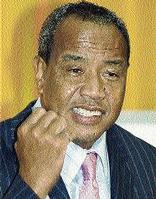Ashford W. Meikle, Business Reporter

Michael Lee Chin, chairman of National Commercial Bank, gestures as he addresses a mutual funds seminar hosted by NCB Capital Markets Limited, a subsidiary of the banking group, at the Hilton Kingston, Wednesday. - Winston Sill/Freelance Photographer
Warning investors against succumbing to their greed, National Commercial Bank (NCB) chairman, Michael Lee Chin, has criticised speculative foreign currency trading, describing it as unsustainable and contrary to prudent investing.
On Wednesday night, Lee Chin warned investors to be wary of the high returns being offered by local currency traders - estimated to be anywhere from 10-17 per cent per month, which translates to 120-204 per cent per year.
"Be careful of your greed; I see a mania developing," said the billionaire, in a highly charged presentation, at a NCB Capital Markets investor briefing.
"It is going to end in disaster - I don't know how much plainer I can get. I am very passionate about this!"
Lee Chin made no direct reference to speculators, but he would have been speaking of companies like Olint Traders, led by David Smith, which moved its base of operation to the Eastern Caribbean, registering Olint Corporation St. Kitts, and subsequently the Turks and Caicos Islands for its international trading currency activities after a 'cease and desist' order was issued earlier this year by the Financial Services Commission.
It is estimated that Olint, which describes itself as an investment club, rather than a securities dealer, may have invested as much as US$100 million for some 700-high net worth and average-income clients, luring them away from some of the more established financial houses.
With the main trading centres located in London, Tokyo and New York, the international foreign currency trading market has an estimated value of US$2 trillion traded daily, dwarfing the combined US$70 trillion annual bonds and stock market.
In fact, Olint has, in the past, argued that currency trading has opened up to investors a greater option, outside of the average 4-6 per cent being offered by local finance houses on hard currency investments.
The foreign currency trader forced established financial houses to sit up and take notice, with Keith Duncan of Jamaica Money Market Brokers acknowledging that it showed there was a pool of local investors with an appetite for high risk for big gains.
But, it is this very expectation plus the exceptionally high returns, which the NCB chairman has painted as a get rich quick mentality and unsustainable since, as he painstakingly pointed out, Warren Buffet, the world's greatest investor and the second richest man with a fortune estimated by Forbes Magazine to be US$42 billion in 2006, has averaged a return of 20 per cent per annum for most of the past 40 years.
"No one Ñ nobody Ñ has done that (earn 120 per cent per annum). So it is highly improbable that is going to happen in Jamaica," said Lee Chin.
Still, the NCB owner's claim that none of Forbes billionaires became wealthy by being currency traders is debatable.
George Soros, with US$7.2 billion and ranked 71st on the Forbes List, made a good portion of his fortune from currency trading.
In fact, on September 16, 1992, commonly called 'Black Wednesday,' Soros earned over US$1 billion when he forced the Bank of England to devalue the pound as a result of a currency speculation which he engineered.
ashford.meikle@gleanerjm.com

